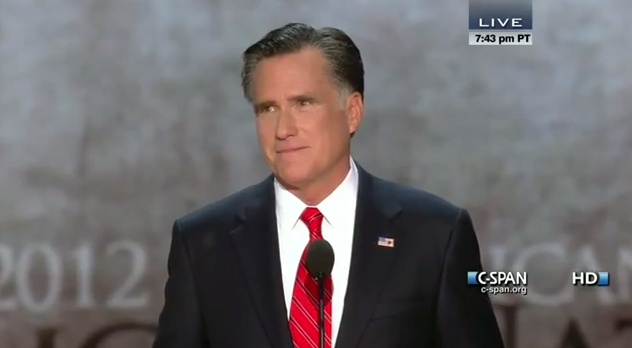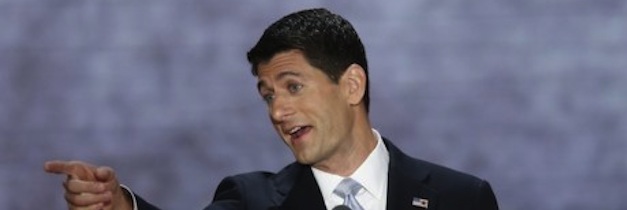As all of the pundits write their summaries of the Virginia gubernatorial race on Tuesday, it is not hard to figure out why Ken Cuccinelli lost: he was left out to rot by the GOP.
According to Cuccinelli campaign strategist, Chris La Civita, financial support from national Republicans dried up on October 1.
“There are a lot of questions people are going to be asking and that is, was leaving Cuccinelli alone in the first week of October, a smart move?” La Civita said after Cuccinelli’s concession speech, according to the Post. “We were on our own. Just look at the volume [of ads].”
Also of note, Boyd Marcus, the chief of staff for House Majority Leader Eric Cantor until 2003, went to work for the McAuliffe campaign. Said Marcus to the Associated Press when he joined the campaign in August:
“I was looking at the candidates, and I saw Terry McAuliffe as the guy who will work with everybody to get things done.”
Get things done? That’s typically a phrase you hear when Republicans jump ship to suck up to Democrats.
Another great line from Marcus in why he supported McAuliffe (emphasis mine):
Virginia needs an experienced businessman who will put the practical needs of our people ahead of political ideology. I’ve never before supported any Democrat, but this election Terry is the clear choice for mainstream conservatives.
I am excited to work with him to grow the already-long list of prominent Republican leaders who are supporting his campaign. Virginia is facing tremendous economic headwinds and we need a Governor who is going to work with both parties.
Translation: Blast you extremist right-wingers and your ideology!
But look at that statement again. “I am excited to work with him to grow the already-long list of prominent Republican leaders who are supporting his campaign.”
Who are these Republicans, you ask?
Matthew Boyle over at Breitbart has composed a short list of them:
Former Republican National Committee finance chairman Dwight Schar supported him, too. “As a Republican and especially as a Virginia businessman, I am supporting Terry McAuliffe for Governor,” Schar said in a statement posted on McAuliffe’s website.
“Terry is going to work with both parties to enact mainstream solutions that reduce traffic, improve our schools, and develop our workforce for the global marketplace. Ken Cuccinelli’s ideological agenda has divided Virginians and blocked progress on education and transportation for long enough.”
In addition, we have Judy Ford Wason, a GOP strategist who worked for outgoing Republican Virginia Gov. Bob McDonnell, former Virginia Sen. John Chichester, former state GOP Sen. Russ Potts, along with former Virginia GOP delegates Vince Callahan, Katherine Waddell and Jim Dillard.
What this amounts to is a stunning betrayal by one’s own party, or at least the more establishment wing of the Republican party.
Sadly, such betrayal is not a surprise since it’s not the first time that a Tea Party-backed candidate was left out to dry while the GOP establishment sided with the Democrat.
Lest we forget, in the 2010 Senate race in Delaware moderate, Mike Castle, lost to Tea Partier Christine O’Donnell. Within 24 hours of that primary, the NRSC, led by John Cornyn announced they would not be sending O’Donnell one red dime for the general election. He later had to recant that because of grassroots outrage, but the fact he would do that at all signals where his real sympathies lie.
Also of note, there were many lies being told about Ms. O’Donnell’s taxes. And who picked up those lies and ran with them but our own Karl Rove, who spoke often of “character issues” with Ms. O’Donnell. But no character issues were cited in relation to Castle, who not only had the voting record of a Democrat, but was also allegedly planning to switch his party affiliation to Democrat if he won the general in a deal with Harry Reid.
Another example was in 2012 in Indiana.
After Richard Lugar got thumped by Richard Mourdock in the biggest loss I can recall for an incumbent in a primary, Lugar not only refused to endorse Mourdock, he regularly referred to him as “an extremist.” And when Mourdock inartfully said that children are a blessing, even when conceived in rape, it gave the Lugar apologists an excuse to throw him overboard and accuse him of being like Todd Akin. Of course, when you look at the full context of Mourdock’s quote, it was nowhere close to what Akin said.
Lugar and Castle both refused to unify behind the winner of the primary as we conservatives were told to do with moderate candidates McCain and Romney. Rather, they sat out, sobbed hysterically about “extremists” taking over the Republican Party, and then when they lost the general, the moderates cheered quietly.
This same GOP establishment behavior attended the Cuccinelli campaign effort. Some in the party refused to accept his nomination, so they took their ball and went home. Even worse, some Republicans actively campaigned for the Democrats.
This is proof of what many of us have suspected since the rise of the Tea Party: Republicans spend more time trying to fight back the Tea Party and stifling conservatives than stopping Democrats.
These cry-baby, old-boy GOP network tactics led to the hysterical denunciations of Ted Cruz and the defund effort. And led to the total surrender on the government “shutdown”.
In fact, this behavior leads to the argument that “there’s a not dime’s worth of difference between the two parties.”
We keep hearing about how Republicans need to unite to defeat the Democrats. Which is true. But how can a party unite when one side keeps knifing the other in the back?
Tuesday’s narrow loss for Cuccinelli, and Christie’s attempts to distance himself from the Tea Party prove there is still a lot of work to do on the uniting front.






